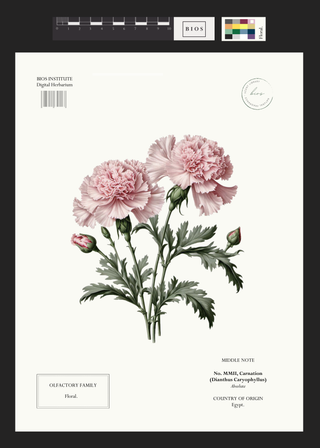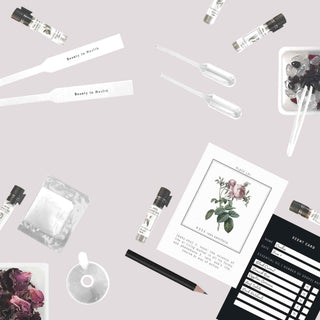

Carnation, also known as Dianthus caryophyllus, is a popular flower used in perfumery for its aromatic and ornamental qualities. It is native to the Mediterranean region, including parts of southern Europe and northern Africa. We source our carnation from Egypt.
Carnation has a rich, spicy, and slightly floral scent. Its fragrance is often described as warm, clove-like, and subtly sweet. Carnation's aroma can vary depending on the variety, but it typically possesses a spicy and aromatic character that adds depth and complexity to fragrance compositions.
Carnation is classified as a middle note in our Floral family. It is widely used as both a standalone note and as a supporting ingredient in various perfumes. Its scent is distinctive and recognizable, making it a valuable component in creating unique and captivating fragrance compositions.
Carnation is a versatile ingredient in perfumery and can be used in a variety of fragrance compositions. It blends well with other floral notes like rose, jasmine, and ylang-ylang, as well as with spices, woods, and oriental ingredients. Carnation can be found in a wide range of perfumes, from classic floral scents to spicy and oriental fragrances.
It is often used in perfumery to evoke feelings of romance, passion, and allure. Carnation's rich fragrance and vibrant colors make it a popular choice for creating romantic and seductive perfumes.
In perfumery, carnation adds a touch of spice, warmth, and complexity to fragrances. Its unique fragrance profile and symbolic associations make it a sought-after ingredient for perfumers. Whether used as a dominant note or as a supporting element, carnation brings a touch of elegance, allure, and timeless charm to fragrance compositions.
Carnations are commonly used in wedding ceremonies and other celebratory events. They are often included in bridal bouquets, boutonnieres, and floral decorations. Carnations symbolize love, commitment, and purity, making them a popular choice for these joyous occasions.
In some cultures, carnations are used in funeral rituals and to honor the deceased. They can be placed on gravesites, used in funeral wreaths or floral arrangements, or given as a gesture of sympathy and remembrance. The color of the carnation may hold specific meaning in these contexts, with white carnations often representing purity and red carnations symbolizing deep love and respect.
Carnations are sometimes offered as a form of devotion and gratitude in religious ceremonies. They may be used as floral offerings in temples, churches, or shrines, symbolizing reverence, beauty, and spiritual connection. The act of offering carnations can be a way to express devotion and seek blessings or divine favor.
Carnations are often associated with specific festivals and cultural traditions. For example, in some countries, carnations are used during Mother's Day celebrations as a symbol of maternal love and appreciation. In other cultural festivities, such as flower parades or floral-themed events, carnations are prominently featured as decorative elements and symbols of beauty.
Carnations have a history of use in folklore and folk medicine. In some traditions, carnations were believed to possess protective properties and were used in rituals to ward off evil spirits or bring good luck. They were also used in herbal remedies and potions for their potential medicinal benefits.
Carnations are strongly associated with Mother's Day in many countries. The tradition of gifting carnations on Mother's Day originated from Anna Jarvis, who campaigned to honor mothers and used white carnations as a symbol of maternal love and purity. Carnations, especially white ones, are commonly given as gifts to mothers or used in floral arrangements during Mother's Day celebrations.
In some Asian cultures, including China, Taiwan, and Korea, carnations are associated with the Lunar New Year festivities. They are often used as decorative flowers during this time, symbolizing good luck, prosperity, and a fresh start for the new year. Red and gold carnations, in particular, are popular choices due to their auspicious colors.
Floriade is a horticultural event that takes place in the Netherlands once every 10 years. It is a celebration of flowers and gardening, attracting visitors from around the world. Carnations, along with other flowers, are prominently featured in the festival's displays, exhibitions, and floral arrangements, showcasing their beauty and cultural significance.
Carnation
- Unit price
- /per
Please note this product format is a small vial that contains roughly 20 drops of scent concentrate. This can be purchased à la carte but is intended to be used with our Perfume Kit.
SCENT SPECIFICATIONS
Latin Name: Dianthus Caryophyllus
Extraction Method: Solvent Extracted
Country of Origin: Egypt
All of the scents in our library are naturally derived - our collection includes essential oils, absolutes, concretes, isolates, enfleurage, macerations, oleoresins, and mixed medium naturals.
Adding product to your cart
Carnation, also known as Dianthus caryophyllus, is a popular flower used in perfumery for its aromatic and ornamental qualities. It is native to the Mediterranean region, including parts of southern Europe and northern Africa. We source our carnation from Egypt.
Carnation has a rich, spicy, and slightly floral scent. Its fragrance is often described as warm, clove-like, and subtly sweet. Carnation's aroma can vary depending on the variety, but it typically possesses a spicy and aromatic character that adds depth and complexity to fragrance compositions.
Carnation is classified as a middle note in our Floral family. It is widely used as both a standalone note and as a supporting ingredient in various perfumes. Its scent is distinctive and recognizable, making it a valuable component in creating unique and captivating fragrance compositions.
Carnation is a versatile ingredient in perfumery and can be used in a variety of fragrance compositions. It blends well with other floral notes like rose, jasmine, and ylang-ylang, as well as with spices, woods, and oriental ingredients. Carnation can be found in a wide range of perfumes, from classic floral scents to spicy and oriental fragrances.
It is often used in perfumery to evoke feelings of romance, passion, and allure. Carnation's rich fragrance and vibrant colors make it a popular choice for creating romantic and seductive perfumes.
In perfumery, carnation adds a touch of spice, warmth, and complexity to fragrances. Its unique fragrance profile and symbolic associations make it a sought-after ingredient for perfumers. Whether used as a dominant note or as a supporting element, carnation brings a touch of elegance, allure, and timeless charm to fragrance compositions.
Carnations are commonly used in wedding ceremonies and other celebratory events. They are often included in bridal bouquets, boutonnieres, and floral decorations. Carnations symbolize love, commitment, and purity, making them a popular choice for these joyous occasions.
In some cultures, carnations are used in funeral rituals and to honor the deceased. They can be placed on gravesites, used in funeral wreaths or floral arrangements, or given as a gesture of sympathy and remembrance. The color of the carnation may hold specific meaning in these contexts, with white carnations often representing purity and red carnations symbolizing deep love and respect.
Carnations are sometimes offered as a form of devotion and gratitude in religious ceremonies. They may be used as floral offerings in temples, churches, or shrines, symbolizing reverence, beauty, and spiritual connection. The act of offering carnations can be a way to express devotion and seek blessings or divine favor.
Carnations are often associated with specific festivals and cultural traditions. For example, in some countries, carnations are used during Mother's Day celebrations as a symbol of maternal love and appreciation. In other cultural festivities, such as flower parades or floral-themed events, carnations are prominently featured as decorative elements and symbols of beauty.
Carnations have a history of use in folklore and folk medicine. In some traditions, carnations were believed to possess protective properties and were used in rituals to ward off evil spirits or bring good luck. They were also used in herbal remedies and potions for their potential medicinal benefits.
Carnations are strongly associated with Mother's Day in many countries. The tradition of gifting carnations on Mother's Day originated from Anna Jarvis, who campaigned to honor mothers and used white carnations as a symbol of maternal love and purity. Carnations, especially white ones, are commonly given as gifts to mothers or used in floral arrangements during Mother's Day celebrations.
In some Asian cultures, including China, Taiwan, and Korea, carnations are associated with the Lunar New Year festivities. They are often used as decorative flowers during this time, symbolizing good luck, prosperity, and a fresh start for the new year. Red and gold carnations, in particular, are popular choices due to their auspicious colors.
Floriade is a horticultural event that takes place in the Netherlands once every 10 years. It is a celebration of flowers and gardening, attracting visitors from around the world. Carnations, along with other flowers, are prominently featured in the festival's displays, exhibitions, and floral arrangements, showcasing their beauty and cultural significance.
